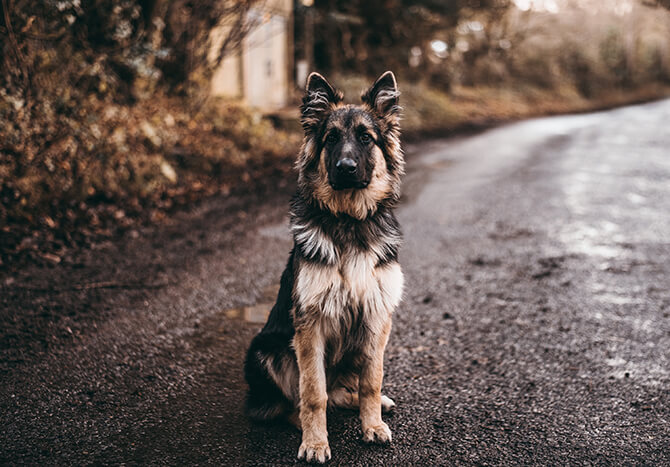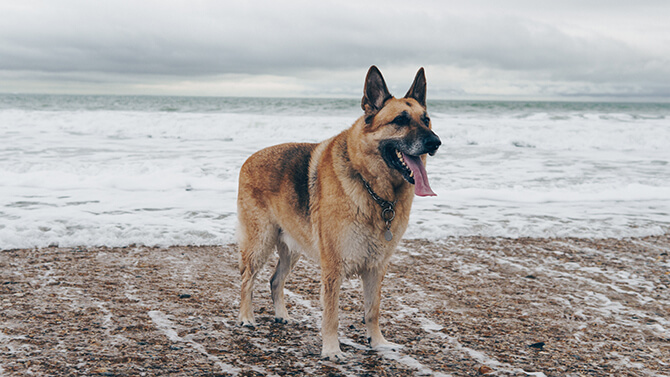German Shepherds are strong, athletic dogs whose intelligence has ensured them a perennial role as police dogs, service dogs, therapy dogs, drug- and bomb-detection dogs, and military dogs. They also make excellent pets, provided that their owners know what they're doing and are experienced with powerful breeds like the German Shepherd. Sadly, a lot of owners get a German Shepherd without having taken the trouble to research the breed and find out what they're getting themselves into first, which results in a lot of sad, mixed-up, abandoned, and often aggressive German Shepherds.
Please note that aggression is NOT a 'typical characteristic' of ANY breed, including German Shepherds. It is a result of bad training and a lack of socialization. There is no such thing as a bad dog, just a bad owner.

German Shepherds are not Golden Retrievers. They are intelligent, athletic, strong-minded and independent dogs requiring firm, knowledgeable training to ensure that they grow up to be well-mannered and well-behaved.
This article deals with ways of preventing and handling aggressive behavior in your German Shepherd.
Common Aggressive Behaviors of the German Shepherd:
Here is a short list of some of the more common manifestations of aggression the German Shepherd breed.
- Lunging
- Growling
- Barking
- Biting
- Snapping
- Fighting with other dogs
Common Causes of Aggressive Behavior in German Shepherds
There are some situations in which aggression is more likely to surface. These include:
- Suspicion and wariness is a hardwired character trait in guard dogs like the German Shepherd. Your Shepherd may well be intensely suspicious of people approaching him when he's eating, which will be expressed through aggressive behavior.
- Stranger-based aggression: again, this stems back to the breed's history as guard dogs. Poorly socialized German Shepherds can react with hysterical aggression at the sight of any stranger on their property.
- Another manifestation of aggression is fear aggression. Instead of the aggressive behavior being based upon a sense of dominance and threat-eradication, poorly socialized German Shepherds can be so excessively shy and anxious around strangers that they snarl and bite out of a sense of fear, rather than true dominance.
Training to Stop Aggression
Make sure you train your Shepherd from an early age. Older Shepherds can still be successfully trained, but it takes more time and effort to first 'untrain' them of any undesirable habits already acquired.
Basics of Aggression Training:
- He needs to recognize that you are the alpha dog. Make sure you're acting like an alpha from the very first day that he joins your household. If you don't, then you may experience resistance at first when trying to assume that role.
- When dealing with aggressive behavior, don't use rough corrections, humiliation, abuse, or corporal punishment. A gentle shake by the scruff of the neck for repeated floutings of the rules is quite enough.
- When he's behaving calmly, reward him with praise, pats, and a food treat.
- Good behavior must be rewarded during training. This is called positive reinforcement training, and recognizes that most dogs - especially intelligent ones like Shepherds - respond eagerly to rewards and encouragement, whereas harsh corrections (loud angry voices, corporal punishment, humiliation) results in the dog 'shutting down' and being unable to learn.
- Ensure that all members of the family are well up to speed on the concepts of the alpha status, on dog psychology, and dog communication.
- Make sure all members of the household take part to prevent him from becoming a one-man dog.
- Training should begin at an early age. Contrary to popular belief, there is no 'minimum age' for a Shepherd to begin obedience training. As soon as you acquire your pup you can start with housetraining and basic commands like 'sit' and 'stay'.
- Socialization is absolutely mandatory for this breed. ALL dogs need to be socialized, butespecially guarding breeds like German Shepherds. A lack of socialization it THE primary reason that dogs become aggressive. Enrol him in puppy school as soon as he's had his vaccinations and make sure he meets plenty of people and dogs throughout his life.
- Make sure your Shepherd gets enough exercise: lack of exercise is one of the primary causes of aggressive behavior in dogs. Shepherds are VERY active dogs who need a lot of vigorous exercise each day. Take him jogging, running alongside a bike, Rollerblading, hiking, and play several interactive games with him as well (like fetch). At the VERY LEAST he should be getting a 45 minute, vigorous power-walk every day.
- Shepherds should be kept on leashes in public places. If your Shepherd is exhibiting signs of aggression, this is mandatory, even in areas where other dogs are running free.
- If your dog is a confirmed trouble-causer, you will have to equip him with a muzzle whenever you go out in public.
- There are special obedience classes for aggressive dogs available in most cities and towns. Sometimes they're called 'Feisty Fido', sometimes they're called 'Growl School', but they all have a very high trainer/dog ratio and all trainers are highly qualified in dealing with aggressive dogs.
- At the very least, you should be taking your Shepherd to standard obedience classes to at least the intermediate level. You need to be keeping his mind occupied and stimulated, for a start, but it will also come in very handy during danger times: if your Shepherd is about to get into a fight, for example, you'll be able to break the build-up of tension which is crucial to the beginning of a dogfight with a 'Come here' or 'Leave it!'.
It is your responsibility as the owner to make sure your dog is getting what he needs. This means exercise, leadership, training, and affection. Your Shepherd needs ALL of these things to be a healthy, balanced dog.
For regular tips and advice on raising your dog, sign up to our free newsletter, just down the page - it's packed with valuable information on dog training and handling, and you can unsubscribe at any time simply by clicking on the link.
Note: There is even more comprehensive advice on how to train your German Shepherd located at DogObedienceAdvice.com/SitStay


